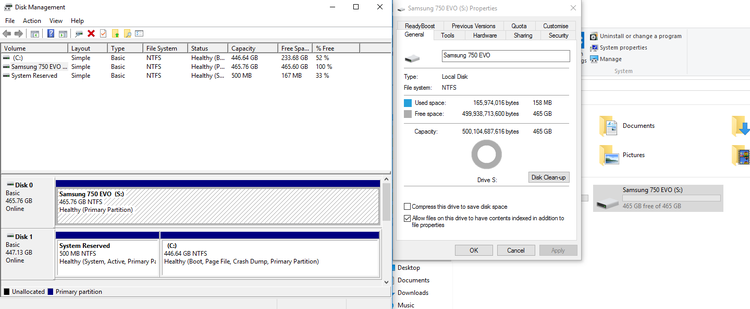The 750 Evo uses 2D NAND, which is found within the 840 Evo, but takes the Samsung MGX controller from the 850 Evo with the aim of bringing better error correction abilities and fewer hardware failures. Also see: Best SSDs to buy in 2016.
Samsung 750 Evo review: Price, competition and price per GB
The Samsung 750 Evo comes in 120-, 250-, and 500GB capacities. Unlike the 850 Evo which is also available in 1- and 2TB variants, the 750 Evo is aimed at those who are on a tighter budget or those who have separate hard drives for their movie, picture and game libraries. Besides the 750 Evo’s storage sizes, the only notable internal difference between them is their DRAM cache memory. The 500GB model has 512MB LPDDR3, while the 120- and 250GB versions have half as much, with 256MB LPDDR3. We received the 500GB model to review and our Windows 10 test rig reported 465GB of available storage space. Read next: How to build a PC. The 750 Evo comes with a three-year warranty, which is shorter than some of its competitors that offer a five year warranty. Read next: Best portable hard drives 2016.
Samsung 750 Evo 500GB review: Specs and features
The 750 Evo uses Samsung’s own MGX Controller which claims to brings lower latency between the processor and its 512MB LPDDR3 DRAM cache memory. It means the drive performs better as 1s and 0s are transferred faster within the SSD’s architecture – at least that’s the idea. The 750 Evo doesn’t possess the 3D NAND technology of the 850, instead opting for the most standard 2D TLC (triple level cell) flash. TLC is essentially the cheapest type used in SSDs like this and suffers from more read/write errors, due to three bits of data being written to a single cell, versus the two in MLC and one-bit per cell SLC technologies found in other SSDs. In order to help in error correction, the 750 Evo has a more advanced low-density parity-checker (LDPC) which is a feature of the Samsung MGX Controller. Since we can’t perform long-term testing, we aren’t able to test the 750 Evo’s reliability, but we’ve found it increasingly rare to see SSDs fail without tell-tale signs. In any case, you should have a full backup of your data and not rely on a single drive, no matter what its claimed reliability or length of warranty. The 750 Evo does have 256-bit AES Full Disk Encryption (FDE), which allows you to use and wipe the drive securely. You will also be able to use the 750 Evo in RAPID Mode through Samsung’s TurboWrite software that effectively allows you to use your PC’s memory modules (RAM) as cache to further boost its performance. The SSD runs on a standard SATA III 6Gbit/s interface. Those wanting to use the SSD with a laptop, the 750 Evo claims to use 2.5W when active and 0.5W when idle. Read next: Best NAS drives 2016.
Samsung 750 Evo 500GB review: Benchmark performance
The 750 Evo performed well throughout our various tests in CrystalDiskMark and AS SSD benchmark. We found it scored very well against the 850 Evo. Looking through the CrystalDiskMark (CDM) Random benchmark, we found the 750 Evo’s ability to keep up with its bigger brother, the 850 Evo, was impressive. However, we did notice that it didn’t perform particularly well in its Random Write 4KB benchmarks, with the 750 Evo managing only 67.3MB/s versus 850 Evo and Crucial BX200 which both respectively managed an impressive 106.2- and 106.7MB/s write speeds. Through CDM’s 0 fill benchmarks, we noticed a few bottlenecks in the 750 Evo’s performance, mainly in its 4KB read/write benchmarks. For example, in its Random Read 4KB tests it scored a read/write of 34.4/68.1MB/s, whereas the Toshiba Q300 was able to manage 95.4/80.2MB/s, a considerable margin given that the Q300 is considerably cheaper. These results weren’t as drastic in its Random read/write 4Kb Q32T1 benchmarks, but as you’ll be able to see in the graph below, was one of the lower-end performing drives. On the plus side, the 750 Evo performed very well in its sequential benchmarks, by even beating its 850 Evo counterpart in its Sequential read/write Q32T1 benchmarks. it comes as no surprise to see the Samsung 750 Evo completely outclass our Seagate ST500DM002 7200rpm hard drive, in as every benchmark. Our AS SSD benchmarks revealed that the 750 Evo is a consistent performer, with its benchmarks remaining high throughout the different SSD tests we ran our drive through. To test the drive’s ability to handle compression, we ran a benchmark through AS SSD and found the 750 Evo to perform well throughout the test. In AS SSD benchmark, we were also able to view its copy speeds and duration, with the 750 Evo performing well through the various tests.
Samsung 750 Evo 500GB review: Should I buy the 750 Evo?
It’s safe to say that Samsung has done a good job with the 750 Evo. It’s not as fast as the 850 Evo (although it’s close in most respects) and its slightly lower price reflects that. However, the Toshiba Q300 (2016) is a much better choice for most people. Not only does it perform just as well as the 750 Evo, but also beats it in a few key benchmarks. And it does so at under £80. Ok, so it comes up around 20GB short as it’s a 480GB drive, but it’s clearly much better value.


